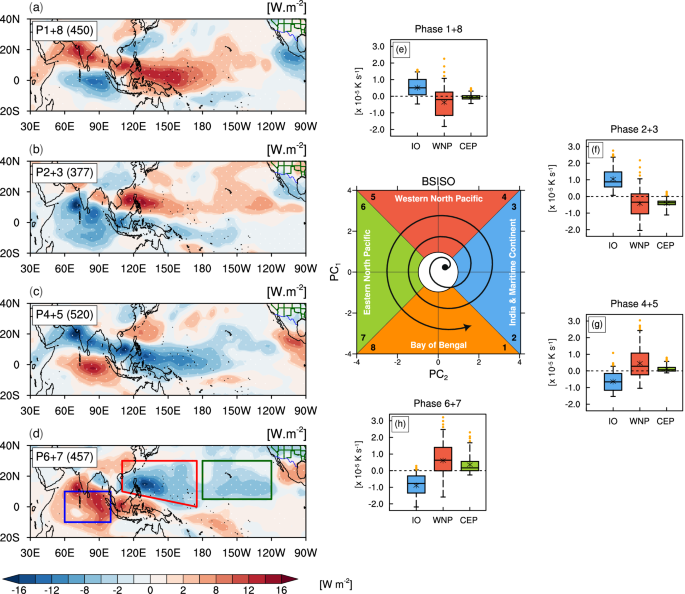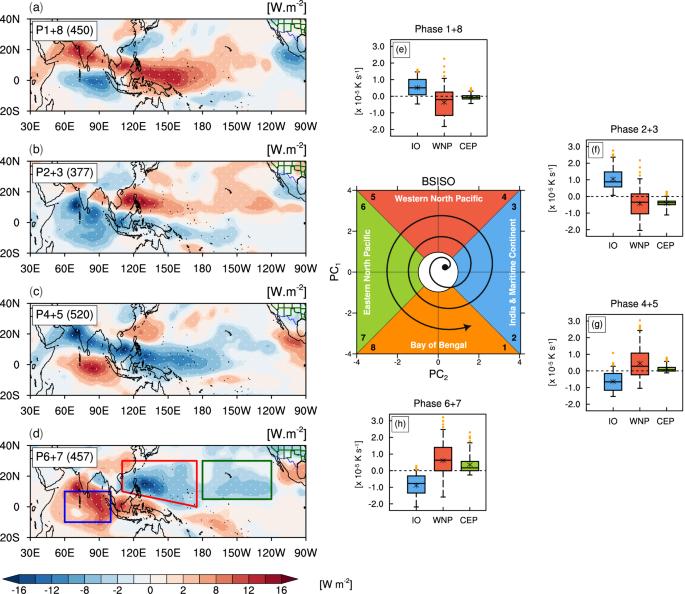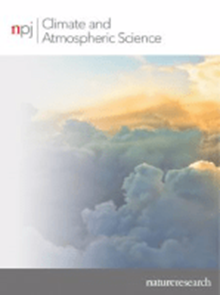Enhanced Pacific Northwest heat extremes and wildfire risks induced by the boreal summer intraseasonal oscillation
IF 8.5
1区 地球科学
Q1 METEOROLOGY & ATMOSPHERIC SCIENCES
引用次数: 0
Abstract
The occurrence of extreme hot and dry summer conditions in the Pacific Northwest region of North America (PNW) has been known to be influenced by climate modes of variability such as the El Niño-Southern Oscillation and other variations in tropospheric circulation such as stationary waves and blocking. However, the extent to which the subseasonal remote tropical driver influences summer heat extremes and fire weather conditions across the PNW remains elusive. Our investigation reveals that the occurrence of heat extremes and associated fire-conducive weather conditions in the PNW is significantly heightened during the boreal summer intraseasonal oscillation (BSISO) phases 6-7, by ~50–120% relative to the seasonal probability. The promotion of these heat extremes is primarily attributed to the enhanced diabatic heating over the tropical central-to-eastern North Pacific, which generates a wave train traveling downstream toward North America, resulting in a prominent high-pressure system over the PNW. The ridge, subsequently, promotes surface warming over the region primarily through increased surface radiative heating and enhanced adiabatic warming. The results suggest a potential pathway to improving subseasonal-to-seasonal predictions of heatwaves and wildfire risks in the PNW by improving the representation of BSISO heating over the tropical-to-eastern North Pacific.


北方夏季季内振荡引起的西北太平洋极端高温和野火风险增加
众所周知,北美西北太平洋地区(PNW)夏季极端炎热干燥天气的发生受到气候变率模式的影响,如厄尔尼诺-南方涛动和对流层环流的其他变化,如静止波和阻塞。然而,亚季节性的遥远热带驱动因素在多大程度上影响了整个西北太平洋地区的夏季极端高温和火灾天气状况,这一点仍然难以捉摸。我们的调查显示,在北方夏季季内振荡(BSISO)的第 6-7 阶段,西北太平洋地区出现极端高温和相关火灾天气条件的几率明显增加,与季节几率相比增加了约 50-120%。这些极端高温天气的出现主要归因于热带北太平洋中部至东部地区增强的二重加热,它产生了一列向北美下游移动的波浪,在西北太平洋上空形成了一个突出的高压系统。随后,海脊主要通过增加地表辐射加热和增强绝热升温来促进该地区的地表变暖。研究结果表明,通过改进对热带至东北部北太平洋上空 BSISO 升温的表示,有可能改进对西北太平洋地区热浪和野火风险的分季节到季节预测。
本文章由计算机程序翻译,如有差异,请以英文原文为准。
求助全文
约1分钟内获得全文
求助全文
来源期刊

npj Climate and Atmospheric Science
Earth and Planetary Sciences-Atmospheric Science
CiteScore
8.80
自引率
3.30%
发文量
87
审稿时长
21 weeks
期刊介绍:
npj Climate and Atmospheric Science is an open-access journal encompassing the relevant physical, chemical, and biological aspects of atmospheric and climate science. The journal places particular emphasis on regional studies that unveil new insights into specific localities, including examinations of local atmospheric composition, such as aerosols.
The range of topics covered by the journal includes climate dynamics, climate variability, weather and climate prediction, climate change, ocean dynamics, weather extremes, air pollution, atmospheric chemistry (including aerosols), the hydrological cycle, and atmosphere–ocean and atmosphere–land interactions. The journal welcomes studies employing a diverse array of methods, including numerical and statistical modeling, the development and application of in situ observational techniques, remote sensing, and the development or evaluation of new reanalyses.
 求助内容:
求助内容: 应助结果提醒方式:
应助结果提醒方式:


